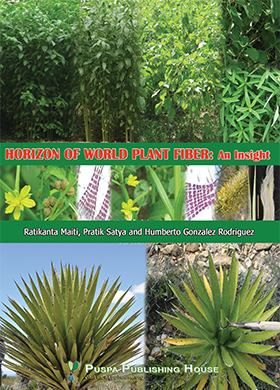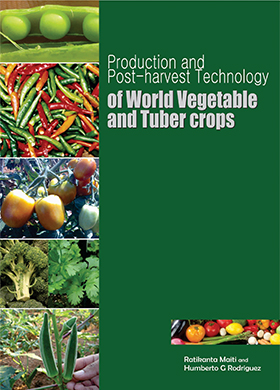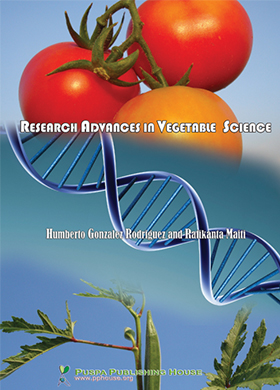Short Research
Knowledge Integration Through ‘e kalpa’- a Cloud Based Interactive Mobile App for Coconut Farmers
Anithakumari P., Arun Kumar Sit and Midhun B.
- Page No: 109 - 112
- Published online: 28 May 2021
- DOI: HTTPS://DOI.ORG/10.23910/2/2021.0416a
-
Abstract
-
anithakumari.p@icar.gov.in
Coconut based farming system is the major livelihood option of small and marginal farm families. Major coconut growing states had high literacy rate and tele density more than 100%. Studies reported low level of ICT use among the coconut farmers. ICAR CPCRI developed the first cloud based interactive mobile app for the mandate crops such as coconut, areca nut and cocoa for the national level stakeholders. A participatory study was conducted during 2017-20 in Alappuzha district to evolve an ICT strategy for coconut community and to develop an interactive multilingual mobile application customized to farmers of different states. ‘e kalpa’ app is refined with components such as knowledge base, field issue management, synchronized farming, input calculator and crop information. It is accessible in online and offline mode and available free of cost in Google play store. Real time reporting of field problems in audio, video or image modes and direct interaction with experts of CPCRI is the unique feature of value added extension service of this app. ICT use in Social Science research enables accurate and reliable data collection in faster and cheaper mode. ‘e plantation survey App’ was designed and evaluated successfully for real time geo referenced data documentation, archiving and analysis.
Keywords : Agricultural extension, e kalpa, e plantation survey app
-
Introduction
Appropriate and timely technology back stopping can improve efficiency of small and marginal farmers. The overall tele density of coconut growing states such as Kerala (129.62%), Tamil Nadu (106.26%), Andhra Pradesh (98.85%) and Karnataka (104.19%) (TRAI, 2021). Smartphones are the upcoming handy tool which can evolve agricultural knowledge towards capacity development of farmers much more effectively than existing extension methods or tools (Sinha and Singh, 2014). Social media usage among farmers indicated that 72.1% men and 27.83% women use farm information from Face book indicating the gender gap (Anithakumari et al., 2016). Farming is time critical, information intensive and warrants integration of tacit and explicit knowledge for better utility in field situations. Study in Odisha found that mobile phones were ranked first in case of information exchange and rapid communication but only third for receiving farming information, pointing to the need of farming apps (Sethy and Mukhopadhyay, 2020). Mobile phone based ICT tools enable to minimize the temporal, spatial gaps and provides right and authentic information directly. The perceived favourability of mobile apps, among small scale farmers for capacity building and developing competencies, demands shift in focus of extension programs for reachability and effectiveness (Landmann et al., 2020).
Hence this study was taken up with objectives as follows:
1. To develop rapid customized interactive mobile App for coconut, areca nut and cocoa.
2. To study the perceptions of coconut farmers in effective utilization of ‘e kalpa’.
3. To design and evaluate survey application for real time geo referenced and accurate data.
-
Materials and Methods
The study was conducted in Alappuzha district during 2017-20. A prototype of Android mobile application for coconut farmers was uploaded and participatory study of the users perception was done among 60 users in terms of contents, presentation, acceptability and refinement. A mobile based survey application also was designed and uploaded for assessing the user friendliness, efficiency in real time data documentation, transfer and reliability of the instrument, for social sciences research. The structure and basic information is furnished as follows and the user diagram of ‘e kalpa’ in Figure 1. System Structure was built on Cordova framework, Cloud Server—CentOS which is a Linux distribution, Database used at the server side—MySQL (v 5.6) and Server side web application built on Yii2 framework.
-
Results and Discussion
Integrating technologies and knowledge system effectively among small and marginal coconut farmers is a challenge. Regarding utility of information sources, 40% of the farming household seeks any information sources and public extension system cater only 5.7% (Adhiguru et al., 2009). Hence, based on the feedback received from the farming community/users, the fist mobile App on coconut, areca nut and cocoa, ‘e kalpa’ was developed and uploaded in Google Play store. This tool was developed with the farming technologies and social research based inputs integrated with computer expertise of M/s. Stegoc technologies private limited company during three years of discussions, trials and refinements based on feedback analysis. Public private partnerships (PPP) may be adopted as a better mechanism to balance technical and economic interventions for broad progress of agricultural innovation (Hermans et al., 2019). The multilingual App is freely accessible in offline and online mode, in English, Hindi, Malayalam, Kannada and Bengali languages. The components of the e kalpa comprised of knowledge base containing 105 technologies snippets on coconut (69 Nos.) areca nut (21 Nos.) and cocoa (16 Nos). The component “basic crop information” in English and Malayalam languages of 59 inter/mixed crops was made available for users practicing coconut and areca nut based cropping systems as a ready reckoner.Maintenance of biodiversity for nutritional security, especially in homestead system demands multiple crop information for a single farmer. This feature aids farm planning and to thrive challenges of reduced mobility during pandemic times such as Covid 19 or any communicable disease or natural calamities.
Based on the farmers’ feedback an ‘input calculator for coconut’ was added and the farmer users could get customized detailed output on quantity of inputs to be applied for exact number of coconut seedlings/bearing palms individually and in total, in their gardens upon entering the details in English or Malayalam. However, several studies showed the efficiency and need for interpersonal communication in knowledge transfer among farming community. Covid 19 situations require confidence building and assurance of real time customized knowledge/field support through effective online/mobile resources and care should be taken for an inclusive approach for resource poor farmers also. In ‘e kalpa’ field problem diagnosis and advisory services named ‘field issue management system’, for field level recording and instant reporting of field issues/ problems of coconut palms as audio, video, images and messages through their mobile phones is enabled. They can record and had the options to send it to ICAR CPCRI instantly in online mode and get the solution in real time through the mobile phone from the scientists irrespective of locations. Information and knowledge are important production factors adoption and improving farm income. Farmers reports 5 to 7 field problems daily on an average and during covid pandemic period (2020-21) the field problem reporting was 104% more than the previous year corresponding period. Analysis of mobile applications in agriculture indicated the absence of dynamic apps and geographical area wise accurate and validated information to farming communities (Costopoulou, 2016; Patel and Patel, 2016). The interactive feature of the app makes it authentic and reliable to the users and the major attributes ranked by the users and the results were furnished in Table 1.
The preference of the users about the contents in local language and the offline mode access is indicated in Table 2. Timely problem solving and quality of information adds to the confidence of the farmers/ users and the outcome in the improvement in yield is an observable result. Thus the income of farmers could be improved through ICT in a sustainable, long term planning and evolving programmes using data archived in a time saving manner. Real time access of information, accuracy, reliability, local language, dynamic contents were major attributes positively percieved by farmer users (Janssen et al., 2017; Verma and Sinha, 2018; Kandagor et al., 2018; Evans and Evans, 2016; Hakkak et al., 2013; Kesharwani and Singh, 2012; Alsamydai, 2014).
Table 2 indicated that majority (95%) of the users faced constraints such as the internet connectivity and the speed in readily using the mobile app in rural areas. Needed more awareness campaigns in improving the users base also required. These constraints of mobile users were reported in similar lines in various studies across countries and communities (Deichmann et al., 2016; Baruah and Mohan, 2018; Prasad and Pradhan, 2019; Manalo et al., 2011; Carrascosa et al., 2012; Mukherjee and Maity, 2015; State of Indian Agriculture, 2016). Public and private stakeholders should extend education and training support to the farmers towards the ICT extension for overcoming challenges with particular emphasis to small scale and resource poor farmers (Rasouliazar, 2011).
e Plantation survey App : Agricultural Extension research and development requires accurate, reliable and real time data documentation to avoid human errors. Hence, based on the scientific needs and for effective utilization of available resources ‘e-plantation survey app’ for digitized data collection was developed. Survey could be done paperless, time saving, avoiding drudgery of master sheet preparation, maintain data integrity, GPS tagged real time data documentation and rapid downloading in compatible format. The app could be operated in online and offline mode enabling data documentation from remote areas also avoiding internet dependency.
-
Conclusion
Appropriate and systematic management of messages is critical in achieving the required impact of ICT tools in farming. In small holders crop like coconut ICT tools warrants knowledge mapping in multiple languages and tacit and explicit knowledge. Socio-demographic categories based content creation and application features, along with interfaces applicable for different user groups among coconut communities have to be developed in future utilizing artificial intelligence. e kalpa with its multiple features enables co-creation of knowledge and data for feedback and purpose based research support to field issues of farmers.
-
Acknowledgement
The authors deeply acknowledge all the scientists of ICAR CPCRI as the team, for providing the entire knowledge base and for the translation of the technology snippets and conducted with the kind and supports from Institute.
-
Adhiguru, P., Birthal, P.S., Kumar, G.B., 2009. Strengthening pluralistic agricultural information delivery systems in India. Agricultural Economics Research Review 22, 71–79.
Alsamydai, M.J., 2014. Adaptation of the technology acceptance model (TAM) to the use of mobile banking services. Journal of International Review of Management and Business Research 3(4), 2016–2028.
Anithakumari, P., Muralidharan, K., Thampan, C., Kalavathi, S., 2016. Farmer initiatives in ICT use for information exchange. Journal of Global Communication 9, 59–70.
Baruah, D.M., Mohan, C.R., 2018. Connectivity and Regional Integration: Prospects for Sino-Indian Cooperation. In: Mayer, M. (Eds), Rethinking the Silk Road. Palgrave Macmillan, Singapore. https://doi.org/10.1007/978-981-10-5915-5_5 84-95.
Carrascosa, F.J.M., Gonzalez, I.L.C., de la Orden, M.S., Garcia-Ferrer, A., 2012. Real-time mobile phone application to support land policy. Computers and Electronics in Agriculture 85, 109–111.
Costopoulou, C., Ntaliani, M., Sotiris, K., 2016. Studying mobile apps for agriculture. Journal of Mobile Computing and Application 3, 44–49.
Deichmann, U., Goyal, A., Mishra, D., 2016. Will digital technologies transform agriculture in developing countries. Agriculture Economics (United Kingdom) 47, 21–23.
Evans, I., Evans, C., 2016. The influence of eWOM in social media on consumers’ purchase intentions: An extended approach to information adoption. Computers in Human Behavior 61, 47–55.
Hakkak, M., Vahdati, H., Biranvand, V., 2013. An extended technology acceptance model for detecting influencing factors: An empirical investigation. Management Science Letters 3, 2795–2804.
Hermans, F., Geerling-Eift, F., Potters, J., Klerkx, L., 2019. Public private partnerships as systematic agricultural innovation policy instruments- Assessing their contribution to innovation system function dynamics. NJAS- Washington Journal of Life Sciences 88, 76–95.
Janssen, S.J.C., Porter, C.H., Moore, A.D., Athanasiadis, I.N., Foster, I., Jones, J.W., Antle, J.M., 2017. Towards a new generation of agricultural system data, models and knowledge products: Information and communication technology. Agricultural Systems 155, 200–212.
Kandagor, J.C., Githeko, J.M., Opiyo, A.M., 2018. Usability attributes influencing the adoption and use of mobile apps for dissemination of agricultural information. International Journal of Agricultural Extension 6, 33–41.
Kesharwani, A., Singh, B.S., 2012. The impact of trust and perceived risk on internet banking adoption in India: An extension of technology acceptance model. International Journal of Bank Marketing 30, 303–322.
Landmann, D., Lagerkvist, C.J., Otter, V., 2020. Determinants of small scale farmers’ intention to use smartphones for generating agricultural knowledge in developing countries: Evidences from rural India. The European Journal of Development Research Published online https://doi.org/10.1057/s41287-020-00284-x.
Manalo, J., Eligio, A., 2011. Making ICT initiatives more relevant creating spaces for farmers participation in ICT policies in the Philippines. In: 6th CPR south conference on Communication reforms: From Research to Practice, Bankok, 9–10.
Mukherjee, A., Maity, A., 2015. Public-private partnership for convergence of extension services in Indian agriculture. Current Science 109, 1557–1563.
Patel, H., Patel, D., 2016. Survey of android apps for agriculture sector. International Journal of Information Science and Technology 6, 61–67.
Prasad, V.C., Pradhan, K., 2019. Assessing the Extent of ICT Usage by Farmers for Sustainable Agriculture in Sub-Himalayan Region.Indian Research Journal of Extension Education 19, 15–18.
Rasouliazar, S., 2011. Study of the Importance and Application of Information and Communication. Technology by Agricultural Experts in Iran. World Applied Sciences Journal 12, 999–1004.
Sethy, S., Mukhopadhyay, S.D., 2020. Use of ICTs by Farmers: A Study in Odisha. Asian Journal of Agricultural Extension, Economics & Sociology 38, 74–86.
Sinha, A., Singh, S.R., 2014. Mobile learning for transforming education and improving learning outcomes on agriculture in India. International Journal of Agriculture science, Research and Technology 3, 163–171.
State of Indian Agriculture., 2016. Report by Government of India https://eands.dacnet.nic.in/PDF/State_of_Indian_Agriculture.pdf) 24.
Telecom Regulatory Authority of India, (TRAI). 2021. Press Release No. 16/2021. Dated 31st January, 2021.
Verma, P.,Sinha, N., 2018. Integrating perceived economic well being to technology acceptance model: the case of mobile based agricultural extension service. Technological Forecasting and Social Change 126, 207–216.
Reference
Cite
P, A., Sit, A.K., B, M. 2021. Knowledge Integration Through ‘e kalpa’- a Cloud Based Interactive Mobile App for Coconut Farmers . International Journal of Economic Plants. 8,1(May. 2021), 109-112. DOI: https://doi.org/10.23910/2/2021.0416a .
P, A.; Sit, A.K.; B, M. Knowledge Integration Through ‘e kalpa’- a Cloud Based Interactive Mobile App for Coconut Farmers . IJEP 2021,8, 109-112.
A. P, A. K. Sit, and M. B, " Knowledge Integration Through ‘e kalpa’- a Cloud Based Interactive Mobile App for Coconut Farmers ", IJEP, vol. 8, no. 1, pp. 109-112,May. 2021.
P A, Sit AK, B M. Knowledge Integration Through ‘e kalpa’- a Cloud Based Interactive Mobile App for Coconut Farmers IJEP [Internet]. 28May.2021[cited 8Feb.2022];8(1):109-112. Available from: http://www.pphouse.org/ijep-article-details.php?art=280
doi = {10.23910/2/2021.0416a },
url = { HTTPS://DOI.ORG/10.23910/2/2021.0416a },
year = 2021,
month = {May},
publisher = {Puspa Publishing House},
volume = {8},
number = {1},
pages = {109--112},
author = { Anithakumari P, Arun Kumar Sit , Midhun B and },
title = { Knowledge Integration Through ‘e kalpa’- a Cloud Based Interactive Mobile App for Coconut Farmers },
journal = {International Journal of Economic Plants}
}
DO - 10.23910/2/2021.0416a
UR - HTTPS://DOI.ORG/10.23910/2/2021.0416a
TI - Knowledge Integration Through ‘e kalpa’- a Cloud Based Interactive Mobile App for Coconut Farmers
T2 - International Journal of Economic Plants
AU - P, Anithakumari
AU - Sit, Arun Kumar
AU - B, Midhun
AU -
PY - 2021
DA - 2021/May/Fri
PB - Puspa Publishing House
SP - 109-112
IS - 1
VL - 8
People also read
Full Research
Valerian and Yarrow: Two medicinal Plants as Crop Protectant Against Late Frost
M. Stefanini, L. Merrien, P. A. MarchandValerian, Yarrow, plant extract, plant protection, elicitor, anti-freezing action, hail damages
Published Online : 28 Nov 2018
Full Research
Soil Potassium Fractions as Influenced by Integrated Fertilizer Application Based on Soil Test Crop Response under Maize-Wheat Cropping Systems in Acid Alfisol
Ibajanai Kurbah and S. P. DixitCropping sequence, IPNS, maize, potassium, STCR, wheat
Published Online : 28 Feb 2019
Full Research
Occurrence of Diseases in Floricultural Crops in and around Jorhat, Assam
Munmi Borah, Moyurtrishna Rajkhowa and Sakendar AliDisease incidence, floricultural crops, survey, pathogenic diseases, microscopic observation
Published Online : 28 May 2019
Short Research
Influence of Growth Regulators on Quality and Fruit Attributes of Custard Apple (Annona squamosa L.) Cv. Balanagar
U. K. Thorat, R. M. Dheware and A. R. JadhavGrowth regulators, quality, fruit attributes, custard apple
Published Online : 28 Aug 2018
Full Research
Assessment of Fruit Drop in Different Cultivars of Litchi
Narayan Lal, Abhay Kumar, E. S. Marboh, Vishal Nath and S. D. PandeyImproper pollination and fertilization, embryo abortion, seed and fruit borer, abscission
Published Online : 28 Nov 2021
Review Article
Status of Bamboo in India
Salil Tewari, Harshita Negi and R. KaushalArea, bamboo, cultivation, diversity, India, species
Published Online : 28 Feb 2019
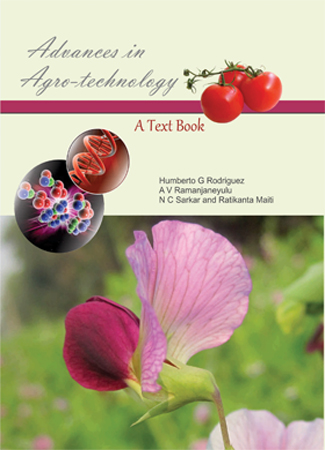
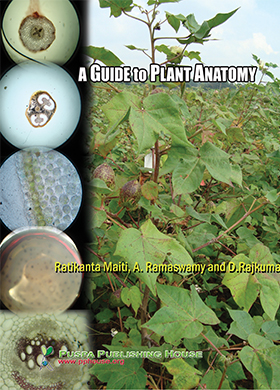
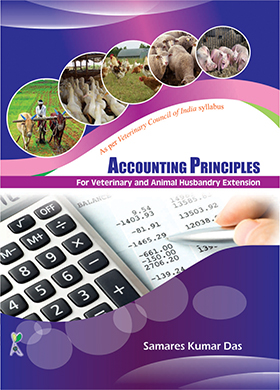
.jpg)
.jpg)


